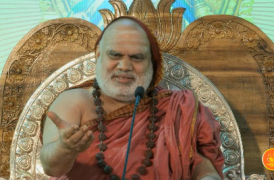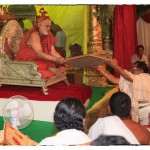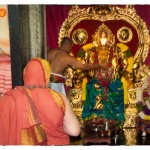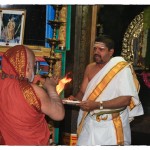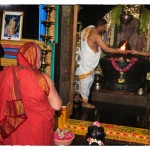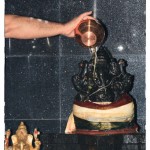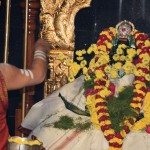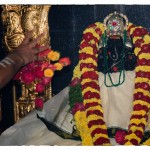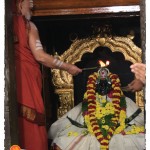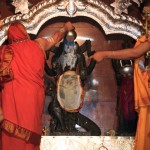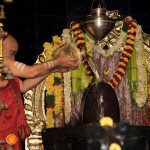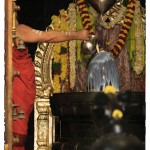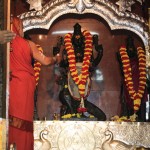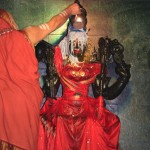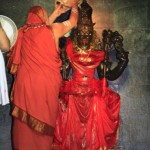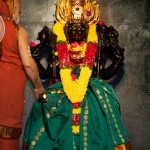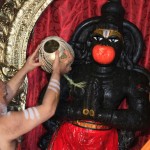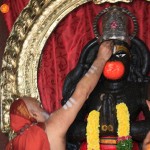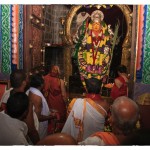
Secunderabad: DECEMBER 15 – 16, 2012
The Jagadguru Arrives at Secunderabad
On 15th December evening, Jagadguru Shankaracharya Sri Sri Bharati Tirtha Mahaswamiji arrived at Secunderabad and was received with Poornakumbha Swagata at the entrance of the Sannidhis at the Siddhi Vinayaka temple. In the public function that followed the Jagadguru gave a Anugraha Bhashanam
ANUGRAHA BHASHANAM: GOD & KARMA IN SANATANA DHARMA
It is our Shraddha that there is a Conscious Entity that is the Creator for this vast Universe. He creates and sustains it, and finally dissolves it in Himself. We call this Conscious Entity as God or Ishwara or Bhagavan. Where does He exist? This question is answered by another question: “Where does He not exist?”. The Shastras state that Bhagavan is omnipresent. He is in every atom. He is called Sarva Vyapi – all pervading.
If you do not accept this, you cannot answer the questions, who created the Universe or who dispenses the fruits of our actions.
We experience both joy and suffering in life. There must be causes for this, for no effect can exist without a cause. If one student passes in an exam and another fails, can these results be merely attributed to chance? The first student studied hard while the second never really studied. Thus it is natural that every result or effect has a cause.
Hence what could be the cause for our joy and suffering? The causes are the Punya and Papa Karma we performed in our past.
However, who decides the fruit of every Karma? Even in the worldly example, a conscious entity has to exist to grade the answers of a student. Similarly, a conscious entity must exist to evaluate our actions and decide that such and such a fruit be accorded based on every action performed by us. We refer to this conscious Entity as Parameshwara or Bhagavan. It is Parameshwara, who without any sense of favoritism, ensures that each person gets the result in accordance to one’s karma.
Some wonder if God favours the wealthy. Some wonder if His grace shines only on the scholarly. And some end up thinking that God favours those who are in power. It must be realized that God does not favour anyone be it the wealthy, scholarly or powerful. His Grace can be obtained only by Bhakti. For instance, Sri Krishna Paramatma refused to accept the hospitality of Duryodhana who welcomed Him with a gold Poornakumbha. Instead Sri Krishna accepted the hospitality of the devout Vidura.
Some question, “Why does not God listen when I call out to Him?”. The answer to this question is “Are you calling out to God like Draupadi called out? Are you calling out to Him like Gajendra called out?”
Some wonder, “Why does not God accept what I offer”. Let such people reflect if they are offering to God with the same devotion as the great Shabari.
Bhagavan Himself proclaims – न मे द्वेष्योऽस्ति न प्रियः – signifying that He is impartial.
We must never forget Bhagavan under any circumstances. How can we ever forget Him, who protects us? Some immediately question, “How do you see God protects us? I work, I earn my livelihood and eat out of my earnings. What role does God play?”
यो मे गर्भगतस्यापि वृत्तिं कल्पितवान् प्रभुः ।
शेषवृत्तिविधाने तु सुप्तः किं नु मृतोऽथवा ॥
Who protected you when you were in the most helpless state of being in your mother’s womb? Who else but God protected you. When He protected you in such a state, do you think that He is not protecting you even now? If His Grace is not there, you will end up losing all that you have taken for granted. A fall from position and good health would be inevitable. Hence no one must think that we are surviving solely on our efforts. Just as a cart needs two wheels to move forward, the journey of life moves forward with the two wheels of God’s Grace and human effort:
यथा ह्येकेन चक्रेण न रथस्य गतिर्भवेत् ।
एवं पुरुषकारेण विना दैवं न सिध्यति ॥
Hence it is also wrong to say “Let everything happen by God’s Grace” and sit idle. You have to use the faculties you have been blessed with. The intellect and the healthy body have to be exerted in the proper direction.
In a related context, someone questioned: What is the meaning of the saying “बुद्धिः कर्मानुसारिणी”. This saying literally means that the intellect acts in accordance to one’s Karma. If one has to experience suffering, one must have done sinful deeds in the past. Hence it is this bad Karma that is going to result in suffering, that drives your intellect to act in the wrong direction and end up in suffering. If it is not your destiny to suffer i.e. if you haven’t performed a Karma that will bring about a particular suffering, then your intellect will not drive you in a direction that will bring about that suffering. Similarly, if you have done meritorious deeds in the past lives, your intellect will drive you towards performing good deeds that will bring about the destined joy. Hence your intellect is driven in accordance to the Karma that you have performed in the past. Why else do only a few get the inclination to engage in crime? Why do only a few get the inclination to engage in the most noblest of deeds? It is because of this that we have the above saying.
Hence it is essential that we put in our own efforts and also keep in mind that God’s Grace is required for succeeding in our endeavours.
Haven’t we seen one farmer getting a good yield and another reaping losses although they both have put in similar efforts under similar conditions? Have we not also seen instances of two students, one being successful and the other struggling, though they had both studied well? One had faith in God and the other did not. This is what point us towards the need for Grace of God and has been said in the Shastras as:
तुल्यं कर्षन्ति पृथिवीं तुल्यं शास्त्राण्यधीयते ।
उन्मज्जन्ति निमज्जन्ति दैवस्यैकस्य लीलया ॥
It has been our tradition since time immemorial to show our gratitude towards God and worship Him by building temples. By doing so, we earn His Grace. We must also remember that God is only one. The Vedas state that there is but one God who pervades all, is resident in every being, who is a Witness to all actions, and is devoid of attributes:
एको देवः सर्वभूतेषु गूढः
सर्वव्यापी सर्वभूतान्तरात्मा ।
कर्माध्यक्षः सर्वभूताधिवासः
साक्षी चेता केवलो निर्गुणश्च ॥
Even for the purpose of discussion, if you were to consider the possibility of two Gods. If one were to wish that it rain, and the other were to wish that it need not rain, should it rain or not? If both the Gods were to always think alike, where is the need for two Gods?
So why do we have so many different deities? The different deities such as Ganapati, Ishwara, Subrahmanya, Amba, Rama, Krishna etc. are all different names and forms of the same God. Even as man sports different roles when enacting a play does God assume different names and forms to grace the devotee.
The Jagadguru blessed Sri Yadi Reddy who had constructed the Siddhi Vinayaka temple and praised His Bhagavad Bhakti and Guru Bhakti. The Jagadguru ended the Anugraha Bhashanam by invoking the Grace of Bhagavan to bless everyone with Daivi Sampat, and the inclination to be ever devoted to God.
Photos
Kumbhabhishekam
On 16th December, the Jagadguru performed the Kumbhabhishekam at the Siddhi Vinayaka temple. The Jagadguru offered Puja at the Sannidhis of Siddhi Vinayaka, Subrahmanya Swamy, Sri Chandramoulishwara, Kanaka Durga, Anjaneya Swamy, and Navagrahas. The Jagadguru then performed the Shikhara Kumbhabhisheka atop the new Raja Gopuram.
Photos
Visit to the Bhavani Temple at Ishwarapuram
In the evening, the Jagadguru started from Secunderabad towards Nacharam. Enroute the Jagadguru graced Ismailkhanpet and visited the Sapta Praakaara Yuta Durga Bhavani temple of the Peetham, at Ishwarapuram.
Photos
